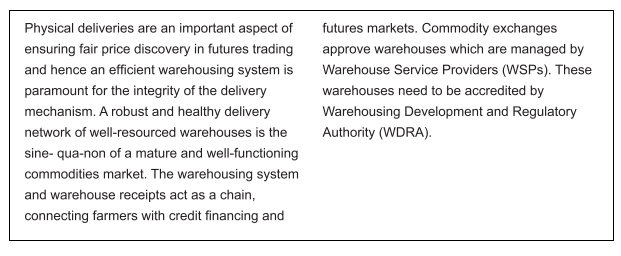

In 2013, a fraud was unearthed at the National Spot Exchange Limited (NSEL) in electronic spot exchange activities which was an integrated trading platform for agriculture products.
There was a deviations and depletion of funds in Settlement Guarantee Fund (SGF) managed by the exchange and stood at only Rs.8.46 million at the time of the fraud and the exchange had an outstanding settlement to the tune of 56000 million.
Issue
Context
In 2013, a fraud was unearthed at the National Spot Exchange Limited (NSEL) in electronic spot exchange activities which was an integrated trading platform for agriculture products.
There was a deviations and depletion of funds in Settlement Guarantee Fund (SGF) managed by the exchange and stood at only Rs.8.46 million at the time of the fraud and the exchange had an outstanding settlement to the tune of 56000 million.
Also, a faulty trading practice with different settlement periods (T+2, T+25, & T+36) of spot contracts led to deferred settlements and enabled the brokers to generate ghost receipts from warehouses without any underlying stock of the farm produce.
About
ISSUES INVOLVED:
The scam brought the loopholes in the regulations governing Electronic Spot Exchanges (ESEs) into the limelight. The investors were exploited by in the name of running an ESE and the Effective Price Discovery Mechanism (EPDM) in the agricultural commodities market was misused for ulterior motives. The scam also led to discourse on corporate governance issues at NSEL, the role and responsibilities of the regulatory bodies and the government in prevention of such scams and protection of investors.
Background
NSEL’s operations were mainly intended to help the agricultural participants in the country to overcome the challenges they faced due to scattered agricultural markets across different states and their respective regulations, and help them to sell and purchase agriculture products at efficient prices through EPDM.
Following the challenge to provide a nationwide integrated platform, government allowed private players to provide the facilities of an Electronic Spot Exchange (ESE). Three players were granted permission: FTIL, NCDEX, and NMCE; FTIL and NCDEX provided electronic spot trading services.
HOW THE EXCHANGE WORKED:
NSEL provided a trading platform to the farmers to sell/purchase their produce. After harvesting the crops, the farmer was to approach a designated warehouse of NSEL where the quality of the harvest would be tested and a receipt would be generated acknowledging the storage of the harvest at the warehouse. Using the receipt, the farmer would trade their produce on the exchange platform.
Analysis
CORE OF THE PROBLEM:
It was based on a product that wasn’t approved by the government. A spot exchange is not supposed to offer forward contracts, but NSEL, it is now widely believed, offered 20-25 day (and some say 40-day) forward contracts. Worse, some of these contracts were so-called “naked” contracts—which mean there was no underlying commodity.
Issue explained - Warehouse receipts 
FACTORS RESPONSIBLE:
- Lack of risk management and regulatory oversight led to the exchange in not following of norms of T+11 as maximum period for settlement of dues in spot market.
- Lack of investors’ education making them vulnerable to enticement of for higher risk-free returns.
- Lack of coordination among government departments, regulators and exchanges for better regulation of market.
STEPS TAKEN BY GOVERNMENT:
The Forward Market Commission (FMC) was directed to probe the issue. The subsequent investigations revealed a major mismanagement of operations and funds at NSEL. Several executives of NSEL were arrested in this connection. Also, the merger of NSEL with its promoting entity FTI was initiated.
Ultimately FMC was merged into the SEBI, which is discussed in detail in the next article.
WAY FORWARD:
Integrated agriculture marketing system has been challenging in a vast country like India and private spot exchanges alone could not suffice objective despite having the capability of providing sophisticated technology to do so. Governmental policies are needed which has led to programmes like GrAMs (Gramin Agricultural Market) and e-NAM (electronic National Agricultural Market).
Domain knowledge among government official to understand the working of markets, better regulatory oversight, use of technology for centralised audit mechanism, etc. are needed for well-functional market and to protect the investors from scrupulous practices.
However, the recent scams like ICICI and PNB show that lessons from NSEL scam are still not learnt.
|
Case: National Spot Exchange Limited (NSEL) Scam NSEL being a spot trading exchange was unregulated as it was not covered under the FMC. The exchange collapsed in 2013 resulting in Rs. 5600 Crore loss to the investors due to non-payment of dues. As per law, spot exchange cannot have contracts beyond T+11 Settlement. However, trading of contracts up to settlements T+35 was taking place in Agri-Products. The arbitrage opportunity between longer and shorter term contracts was exploited by brokers and investors (including public sector units). The profits for NSEL and the investors soared for the next two years. Only after it came under the scrutiny of the Dept. of Consumer Affairs which stopped the trading of illegal contracts. Panic broke out in the market when investors realized that NSEL had no physical stock in its warehouses and the trading of commodities was conducted only on paper. Only 6.7 % of losses could be recovered before the promoter, Jignesh Shah was arrested on multiple counts of fraud. |


